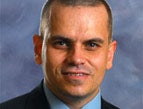|
|
| Watch for Corne' Bekker's new blog, Leadership Beyond Influence, coming soon to CBN.com. |
| |
|
LEADERSHIP
Leading with Heads Bowed Down
By Corne' Bekker
Regent University
CBN.com
– Leadership often draws the wrong kinds of people.
Positions of power and influence have the tendency to attract the proud and the upwardly mobile, self-seeking individualists. A good example of this can be seen in the public images of power-obsessed leadership that are so often projected as the ideal in our success hungry world.
Television programs, such as Donald Trump’s “Apprentice”, drive the point home where leaders are measured by their ability to ruthlessly fight for themselves and climb the corporate ladders of success at any cost. No thought is given to the human casualties on the way.
Some leadership authors have gone as far as describing ideal leaders as idols, heroes, saviors, warriors, magicians, and even as apparent omnipotent demi-gods. Have we been too quick to adopt these models of power-driven leadership in our churches and ministries?
Jesus of Nazareth, arguable the most effective leader of all times, offered an alternative model of humble service for leaders that intended to follow Him:
You know that those who are regarded as rulers of the Gentiles lord it over them, and their high officials exercise authority over them. Not so with you. Instead, whoever wants to become great among you must be your servant. (Mark 10:42-43, NIV)
Jesus describes Christian leaders as humble servants. Humility has received something of a bad press in the leadership literature. Can leaders truly be humble? Would humility even work in the workplace? Some business leaders think so.
Jim Collins, a successful business leader and author, wrote a ground-breaking article on effective business leadership (Level 5 Leadership) published in the January 2001 edition of the Harvard Business Review. Collins proposed that the “most powerfully transformative executives” surveyed in his researched all possessed the virtue of personal humility. It seems that humility is central to effective leadership.
Although Collin’s work does not describe how humility is formed in leaders, it does provide a clear, four-fold description of what humble leaders look like:
- Personally humble leaders demonstrate a compelling modesty. They shun public adulation and never boast. They are more interested in the getting the job done than talking about it.
- Personally humble leaders act with calm and quiet determination, not relying on their own charisma to inspire followers but rather use their own values and moral standards to motivate others.
- Personally humble leaders avoid personal ambition in favor of multi-generational growth and development. They desire to see others succeed.
- Personally humble leaders are self-reflective and tend to appropriate blame towards themselves and not others.
How then is humility formed in leaders? It might not come as a surprise that Jim Collins is not the first person to describe the possibility and power of leadership humility. A sixth-century Christian monk, St. Benedict of Nursia (480-540 A.D.), the father of Western Monasticism, wrote a rule in which he provided his followers with a twelve step process description of how humility is formed in followers and leaders alike. It might be described as a kind of twelve step program to combat leadership pride.
Benedict’s list starts with the most important step in leadership humility, the fear of God. Humility, like leadership, starts and ends with recognizing that God is the ultimate leader: “The first degree of humility, then, is that a person keeps the fear of God before his eyes and be aware of ever forgetting it.”
Leaders who want to emulate Jesus and lead in humility root their leadership in the fear of God, which the Scriptures remind us is the beginning of wisdom (Proverbs 1:7). They lead, as Benedict would say, with their heads bowed down. May we, as leaders, once again recover the humble heart and serving attitude of Jesus.
Watch for Corne' Bekker's new blog, Leadership Beyond Influence, coming soon to CBN.com.
More Discipleship Resources on Spiritual Life
More from Spiritual Life
 Dr. Corné Bekker is an associate professor in the Regent University School of Global Leadership & Entrepreneurship. He previously served as the Assistant-Dean of Rhema Bible College in Johannesburg , South Africa. Dr. Bekker in an ordained minister and has traveled in Africa, Europe, the East and North America to present at churches, ministries, seminars and academic conferences on the subject of Christian spirituality and leadership formation. Dr. Corné Bekker is an associate professor in the Regent University School of Global Leadership & Entrepreneurship. He previously served as the Assistant-Dean of Rhema Bible College in Johannesburg , South Africa. Dr. Bekker in an ordained minister and has traveled in Africa, Europe, the East and North America to present at churches, ministries, seminars and academic conferences on the subject of Christian spirituality and leadership formation.
CBN IS HERE FOR YOU!
Are you seeking answers in life? Are you hurting?
Are you facing a difficult situation?
A caring friend will be there to pray with you in your time of need.
|